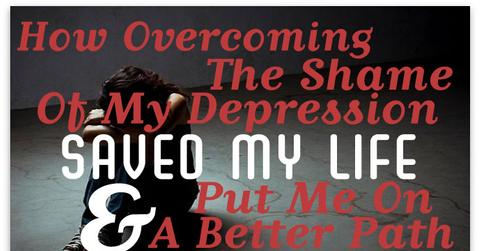How Overcoming The Shame Of My Depression Saved My Life & Put Me On A Better Path To Success

On October 19, 2013, my life changed for the better and the worse.
Four days after being hospitalized, placed on suicide watch, and diagnosed with severe depression, I returned to Agnes Scott College only to pack my belongings and withdraw from school. I barely made it out of the academic advising office before I broke down and cried in my dad’s arms- I was no longer a student.
In this competitive world that we live in, we are told that our time is limited, and in order to make the best of it, we must use our time efficiently. In my head and in the plans I had for my future, to not graduate in four years was not only unacceptable- it wasn’t even an option. I know there must be other college students and adults who have the same thinking, so I am here to set you free from these false constraints! As common as we think it is to graduate in four years, there are sources that show otherwise.
Time Magazine captured my thoughts perfectly in their piece titled: “The Myth of the Four-Year College Degree.” Although college is typically billed as a four-year experience, most students actually need much longer to earn a bachelor’s degree. Pulling facts from the Department of Education, the piece also highlights these statistics:
- Each year, less than 40% of the students who begin college will graduate in four years;
- On average, almost 60% of students graduate in six years;
- And at public colleges and universities, less than a third of college students graduate “on time.”
Of course, I had to take this new information to the next level. How many of these students are in similar situations to myself? How is mental health impacting other students ability to perform? It turns out that I’m not alone. In terms of mental health and its presence on college campuses, the National Alliance on Mental Illness, also known as NAMI, reports this:
- In the last year, more than 11% of college students have been diagnosed/treated for anxiety and more than 10% have been diagnosed/treated for depression
- As stated in a 2011 American College Health Association report, depression and anxiety are among the top factors impacting students’ academic performance
- Suicide is the 3rd leading cause of death on college campuses
- The number one reason why students do not seek help is due the stigmas surrounding mental health
- Without treatment, young adults experiencing a mental health issue are more likely to have low GPA’s, to drop out of college, or be unemployed
As uncomfortable and risky as this discussion is, I chose to share it because these are the unspoken facts that affect college campuses across our country. Yes, I know this is a heavy topic, but my story gets better!
Taking time off to seek help was one of the hardest yet most rewarding decisions I have made in my young life. Here are five lessons that I’ve learned from my experience:
1. Getting Down To The Root of My Situation
During those four days in the hospital, I received some really great advice from patients who were already undergoing the recovery process. I was really struggling with decision of whether I should take time off from school, but for them, the answer was clear. They told me, “Whatever you put before recovery, you will end up losing anyway.” Less than a week later, I moved back home.
Attending rehab, therapy, and support groups has opened me to a self-awareness that I never knew was possible. I have learned so much about myself, such as what parts of my past contributes to who I am and why I responded to life’s challenging moments the way I did. While awareness does not “cure us from depression,” it does open us to the process of understanding and emotional healing. And as I began to experience that healing, I came to understand that it’s okay to take the time to take care of myself.
2. I Learned New Ways of Coping
Not only did I become aware of my unhealthy behaviors- I learned new ways to combat my old decision-making. I learned to broaden my thinking, examine my feelings, and to stay grounded in my truth. Now, I’m not saying that I have mastered this new way of life; after acting out the same behaviors for twenty years, it is sometimes a struggle to put my new tools to use. However, as I continue to practice what I learn, it will become easier to live by.
3. Experiencing a Different College Campus
A couple months ago, I shared about my experience in attending a large university for a semester, and I still stay true to what I wrote. Before withdrawing from school, my mind was stuck in a rigid place. I believed so strongly in the education that I was receiving that I was convinced that no other institution could provide me an equal college experience. Now that I have actually studied at another college and thoroughly enjoyed the classes that I was enrolled in, my mindset has completely changed. I am confident in the fact that I can thrive at another college if I ever choose to do so.
4. Interning with Her Agenda
While I was forced to miss out on some noteworthy events that should have happened my sophomore year, I had the chance to pursue opportunities that still contribute to my academic career. Because I was only enrolled in two classes this past semester, I decided to fill my time with something that I would otherwise not have the time for- I took on an internship. I have learned so many great, new skills working for Her Agenda and have met many inspiring people along the way. Overall, this experience has reaffirmed the career that I want to pursue.
5. I Became Open to Paths That I Had Previously Blocked Off
As the deadline to reapply to school drew closer, I had to face a hard fact- there was a chance that I wouldn’t get back in. In the past, this would have completely terrified me. But after going through recovery and experiencing both its losses and joys, I knew that I would be okay- that if I had to, I could follow a different path and still thrive. I am elated to say that I have been readmitted to Agnes Scott College. However, knowing that I was not dependent on it brings me a sense of peace.
When I first returned home, I experienced a lot of shame. I felt as if I was letting myself down- that my choice to leave school was a setback. But as tragic as the beginning of my journey was, it made my series of victories even greater.
The presence of mental illness on college campuses is a real thing. I’m not saying this to scare people. I share this, because I believe it is an issue that should be discussed openly. My story is one of many, and I hope that it can shed light on the importance of taking care of ourselves. Even further, I hope that we can realize that there is no one set path to success. In the end, I know that my year of self-exploration did not slow my agenda; it enhanced it.





